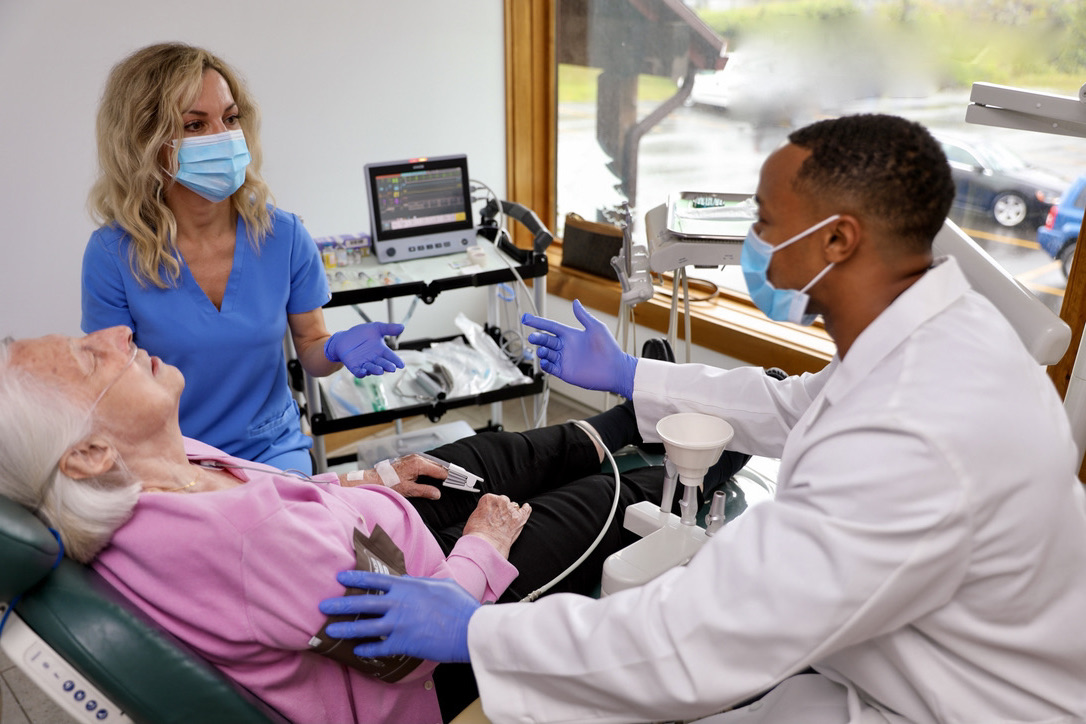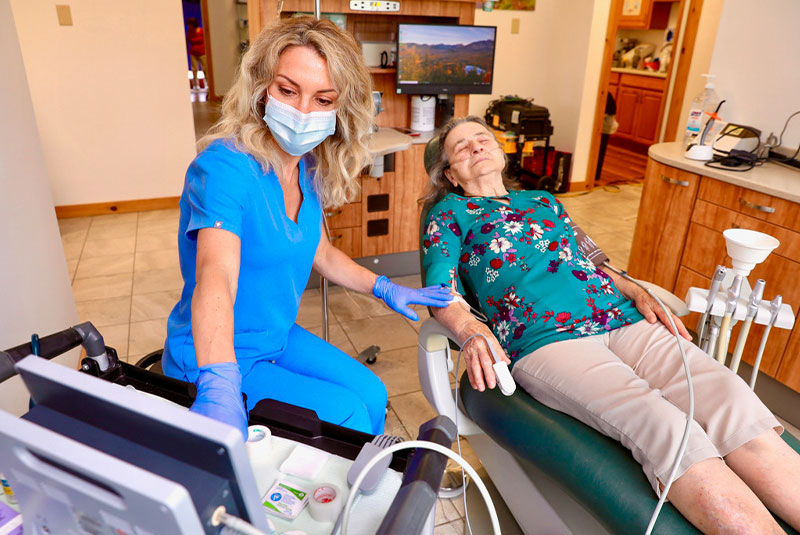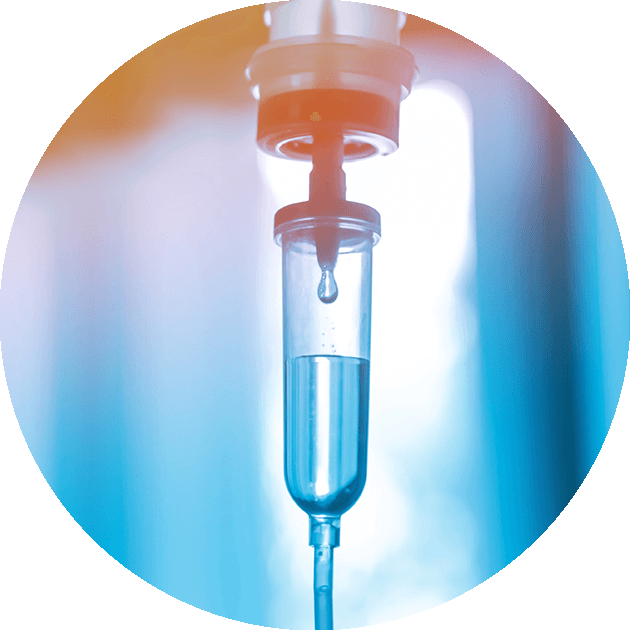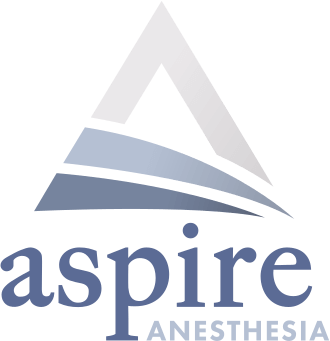
Advanced Anesthesia Services
- Monitored Anesthesia Care (MAC)
- Oral Sedation
- IV Sedation
- General Sedation


What is Monitored Anesthesia Care (MAC)?
When dental procedures are more invasive, or patients are more fragile, it may be best for practitioners to include an Anesthesiologist to monitor the patient’s well-being during the surgery. With MAC, a licensed Anesthesiologist specifically focuses on monitoring and is able to immediately respond to support the patient at any given time during and after the procedure. While MAC may include the administration of sedatives often used for Mild or Moderate Sedation, the qualified anesthesia provider of MAC is focused exclusively and continuously on the patient for any attendant airway, hemodynamic and physiologic derangements.

Oral Sedation vs. IV Sedation: What Is the Better Option for My Practice?
Here at Aspire Anesthesia, we offer both oral and IV sedation to support our patients.
Which is preferred? IV sedation is commonly a more preferred method because deeper levels of sedation can be achieved in a very predictable, fast and safe manner.
Oral Sedation
Oral Sedation refers to the use of sedative drugs that are taken in the form of pills.
PROS:
- Lower Cost: The main advantage to oral sedation is its cost. It is a lower cost alternative to reduce anxiety and fear in the dental chair.
- Commonly considered for patients with mild anxieties and simple dental procedures.
CONS:
- Effective results can vary: Oral sedation medications take around 40 minutes to 1 hour to kick in. The amount of time can also be delayed. Patients may need to arrive earlier, and procedural start times may get delayed.
- Can take longer to wear off: Oral sedation is not readily reversible. In other words, sedatives may not only take time to kick in, they also take time to come wear off post procedure.
- Unpredictable results such as undersedation or oversedation: This is the most common fear of practitioners. How much to prescribe and when? When oral sedatives are prescribed, the initial doses are based on averages and are standardized. The sedatives may not work as effectively for some people as they do for others. Patients may also experience delayed effects. Taking more oral sedation drugs in that moment can be unsafe and high risk for patient overdose.
- Patient vital health monitoring is a preferred practice, but rarely required and performed.
- A dental practitioner commonly self-performs the surgery and patient vital monitoring.
- Oral sedation is less efficient as compared to IV sedation and is not considered sufficient for major surgeries.
- Many practitioners tend to avoid employing oral sedatives with patients. Additionally, not every patient may be considered a suitable candidate for Oral Sedatives. Certain health conditions such as severe gag reflexes or age restrictions may require alternative sedation methods.
IV Sedation
Rather than receiving the medication in the form of an oral pill, with IV sedation, medications are administered directly into the vein. To facilitate this, the doctor places an IV catheter at the start of the procedure. Medications are then given through the IV port painlessly. It brings the patient to a semi-conscious state.
Most dentists cannot perform IV sedation because there is lots of additional training necessary due to the increased complexity of anesthesia care. It is also necessary for the dentist to have an additional license for IV sedation in addition to a license to be a dentist. All this is a good thing because anesthesiology should be taken very seriously because your safety is at risk if is in the wrong hand.
PROS:
- The safest form of sedation: patients are monitored with real-time electrocardiographs and other automated monitoring devices the entire time. In addition, in the event of an emergency, drugs can very quickly be administered to reverse the sedation.
- State of complete relaxation and sleep: You’re able to sleep through your procedure and through complex surgeries while staying in a semi-awake state where you can cooperate. If you wake up too quickly from the sedation, we are able to administer a little more sedative to help you go back to sleep.
- No recollection of events: Many people experience amnesia and are happy to wake up at the end of a complex procedure remembering very little, or none of it at all.
- Predictable success results: Some people require more drugs than others in order to become properly relaxed. This can never be predicted with oral sedation. With IV sedation we are able to “titrate to effect,” meaning we tailor the amount of sedative that is used specific to each patient. This achieves more predictable outcomes and reduces the risk of complications, side effects and potential for pain.
- Precise and immediate: because the drug enters directly into the bloodstream.
- More effective: it is stronger than oral sedation or inhalation sedation (eg. nitrous oxide).
- It is reversible: we have medications to reverse its influence and they take effect nearly instantaneously.
- Appropriate for patients with moderate to severe levels of anxieties and for more complex or lengthly procedures: wisdom tooth surgeries, dental implant placement and surgeries for TMJ disorders.
CONS:
- Cost: IV sedation is greater than other forms of sedation. Having a separate experienced doctor to monitor a patient’s health is critical to ensure patient’s well-being and safety. Many factors attribute to the costs set forth, but the benefits significantly outweigh the costs. Most will agree on the importance of ensuring patient’s health and wellness over fees. At Aspire Anesthesia, please refer to our cost FAQ Section to consider many ways we offer patient flexibility including CareCredit and other financing options.
- While most can, not every patient is suitable for Ambulatory IV sedation, which include factors like age and compromised medical immune conditions. Every patient is evaluated for suitability.
Remember, our goal is to make staying ahead on your patient’s dental health safe, and also to provide as comfortable of an experience as possible. Give us a call and together we can discuss which sedation option best suits your dental practice needs.
A Higher Focus Results in Your Highest Quality Work
Dr. Konstantina Giesberg has spent her education, training, and experience specialized in dentistry. Typically, procedures last around 4 hours and common surgeries include upper and lower arch restorations using full mouth dental implants. As a competent professional, she values the partnerships with dental specialists and the trusted relationships she builds with patients. Working as a cohesive team among oral surgeons, full mouth rehabilitation or full mouth dental implant results happen with increased efficiency. Dr. Giesberg also works with general dentists on full mouth restorations or advanced cases that are 4-6 hours in length. Additionally, with careful training and close monitoring, Dr. Giesberg works with pediatric dentists to administer general anesthesia to adolescents.
Bringing Advanced Anesthesia To-Go

